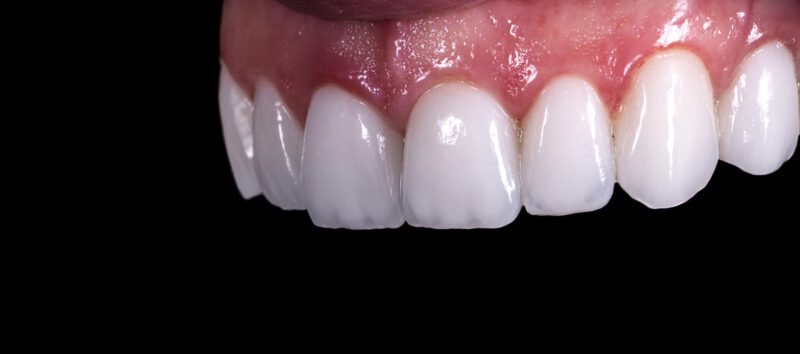Dental Crowns In Santa Clarita, CA
Schedule a Complimentary Dental Crown Consultation Today
Schedule Your Appointment Today Call Now: (661)290-2825If your tooth structure is damaged but not lost, a dental crown can help restore the tooth’s shape, size, and strength as well as improve its appearance. A dental crown is a tooth-shaped dental implant used to cover a decayed or malformed tooth. The crown is needed when the tooth is generally broken down and the fillings can’t solve the problem.

Meet Dr. Soleimani, aka Dr. Pete, a dedicated dentist and father serving Southern California since 2006.
Patients choose Dr. Pete because his care is personalized, pain-free, and his cosmetic and implant dentistry expertise. When he’s not in the office Dr. Pete enjoys all things outdoors, from skiing and hiking to fishing.
Set up a consultation today to learn how Dr. Pete makes every dental visit a positive experience
What Types of Problems Can Dental Crowns Fix?
Dental crowns can solve many problems for dental restoration such as:
- Dental crowns are able to protect a weak tooth from cracking or decay. If a tooth is cracked a crown serves to hold a dental bridge together so the damage won’t get worse
- Crowns can serve for cosmetic purposes, covering misshaped or discolored teeth as well as old or metal mercury fillings. If there isn’t enough of the tooth remaining to support a large filling, crowns help restore a tooth
- After a root canal procedure, a crown may be recommended by the dentist to protect and restore the tooth to its original function

What Types of Crowns Are Available?
Our Santa Clarita dentists offer three types of crowns. Depending on which tooth needs a crown, we suggest a material or a combination of materials that is right for you.
Porcelain-fused-to-metal crowns (PFM’s)
Porcelain-fused-to-metal crowns are made of both metal and porcelain. First, a metal shell is fit over the tooth, then a porcelain veneer is fused on the metal shell. The metal substructure provides adequate strength, while porcelain helps form the overall shape of the crown and gives it a white, natural-looking appearance. Some key advantages of PFM crowns are great durability, proper fit, and aesthetic appeal.
Zirconia crowns
Zirconia crowns are made from zirkonium, a very strong material known for its durability. This material rarely provokes allergic reactions or body rejection. Having a translucent appearance, it is hard to differentiate a zirconia crown from natural teeth. Moreover, zirconia crowns can be modified according to the shape and size of the teeth it will be placed next to.
E-max crowns
E-max crowns are made of a block lithium disilicate ceramic which offers a great combination of appearance and durability. Having a translucent natural-white color and lifelike shape, e-max crowns provide an ideal dental crown. As there is no metal framework on e-max crowns there is no chance of a gray line of metal showing up along your gums. Moreover, they are very strong and long-lasting.
Applying Dental Crowns
There are usually two separate appointments for a dentist to place a dental crown.
- First Visit:
Examination and Application of Temporary Crown The first appointment includes an examination of the damaged tooth, shaping the tooth, taking its impression, and placing a temporary crown. The temporary crown protects your tooth until the final crown is ready. Between the two appointments, a dental laboratory will fabricate the crown. The final crown will be the right size and shape for your mouth. - Second Visit:
Cementing the Crown The second appointment involves taking off the temporary crown and putting on the permanent one. Before cementing the crown into place, we will confirm it is the right fit, shape, color, and bite. As a part of the dental procedure, we will set the crown on your mouth and inspect the way it has seated, then remove the crown and adjust it if needed. Once we agree that all seems right with your new crown, it will be cemented over your tooth. - Maintenance
Crowns are strong and generally last 5-7 years. Treat the crowns like your natural teeth: brush and floss them regularly and don’t bite hard objects. Proper oral hygiene determines the success of your investment.
Frequently Asked Questions About Dental Crowns
The most common issues are tooth sensitivity or an allergic reaction. Choosing an experienced, licensed dentist will help reduce the likelihood of side effects. It’s important to let your dentist know if you have any concerns about the procedure. In most situations, good oral hygiene and slight adjustments done by the dentist will ease discomfort.
The dental crown procedure is no more painful than getting a filling. If you have dental anxiety or a dental phobia, we can administer a local anesthetic to put you at ease during the procedure. We also offer stronger sedation options for those with moderate and severe anxiety about dental visits. It’s important to inform your dentist about your anxiety as soon as possible. We want to do our best to inform our patients and address concerns as soon as possible.
Teeth whitening products that are meant for a natural tooth will not whiten your crowns. We recommend getting your teeth whitened before going in for your dental crown procedure. Avoiding dark sodas, coffee, and tobacco products will help keep your teeth and crowns white. If you already have crowns and want your teeth whitened, it’s important to speak to your dentist. They may recommend replacing your crowns so that they will match your teeth again once they have been whitened.
If you’re interested in crowns, contact our dental office today. The cost of dental crowns will vary based on the materials chosen and number of crowns needed. If your dentist has recommended crowns for damaged or misshapen teeth, your dental insurance may cover some or all of the cost. We also offer a variety of payment options. We believe that fixing dental issues should always be an affordable and viable option.
Post-Operative Instructions
Temporary Crowns and Bridges
Temporary crowns are usually made of soft plastic material and can be easily broken by pressure. That is why you should:
- Avoid chewy and hard foods (gums, crusty bread, taffy, etc.) with temporary crowns.
- Chew on the opposite side of your mouth until the permanent crown/bridge is put in place. You may experience some sensitivity and soreness around the gum for the first few days after the placement.
- Brush your teeth as usual, but floss gently. If, regardless of your precautions, the temporary crown or bridge is dislodged or feels uncomfortable, call us for an inspection.
- Never try to “glue” the temporary restorative devices by yourself. It is recommended to use a special over-the-counter denture adhesive to hold the crown or bridge until you get to our dental office.
Long-term Care of Permanent Crowns and Bridges
After the permanent crowns or bridges are finally placed, you may experience some discomfort, increased sensitivity, or feel like you have an uneven bit for a few days. All listed inconveniences are normal and last no more than 2-4 days after the treatment.
Keep Up With Daily Oral Hygiene
To maintain your new dental crown, it is essential to keep up your daily oral hygiene because crowns and bridges tend to be more susceptible to decay than natural teeth. To provide additional care and decay prevention, use fluoride toothpaste or gel. In the case of sensitive teeth, a sensitive toothpaste will help until it gets better. If sensitivity or discomfort increase after day 4 please call our office for an evaluation.
Avoid Harmful Substances
In spite of being very strong and color stable, porcelain-fused-to-zirconia crowns are not everlasting and can be damaged. As a rough guide, avoid doing anything with a crown or bridge that could potentially break your natural teeth, such as chewy or hard foods and extreme temperatures.
Clean Under the Pontic
In the case of fixed bridges pay special attention to cleaning under the pontic (area where you are missing teeth). To help with this, a bridge threader available in all pharmacies is recommended. The durability and beauty of zirconia crowns depend on your proper dental cleaning technique: it is recommended to use an electric toothbrush and floss regularly to remove all plaque and avoid abrasive kinds of toothpaste to prevent any micro scratches.
Observe Precautions
Pigments don’t influence zirconia crowns, so you can eat and drink freely. Our zirconia crowns are strong and unlikely to crack. However, observing precautions (avoiding hard and chewy foods, wearing mouth guards in risky situations, etc.) and maintaining proper oral hygiene will help keep your crowned teeth healthy for many years to come
Contact Us
Aesthetic Dental & Specialty Center features a comfortable relaxed atmosphere. Our friendly staff and hygienists help put our patients at ease — even the most nervous ones. Our Santa Clarita dentists also provide oral conscious and IV advanced sedation for those patients who need more help to relax.
Whether you need general dentistry services or you have more complex dental needs, our expert dental team serves patients of all ages, and we accept most dental insurance.
No matter where you’re traveling from — Valencia or Stevenson Ranch — Aesthetic Dental & Specialty Center is here to serve you. Take a look at the areas we serve below and schedule a complimentary consultation today!